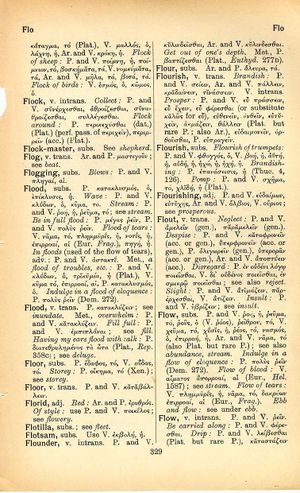flourish: Difference between revisions
From LSJ
Καὶ τῶν λεγόντων εὖ καλὸν τὸ μανθάνειν → It is a fine thing to learn from those who speak well
m (Woodhouse1 replacement) |
mNo edit summary |
||
| Line 11: | Line 11: | ||
===substantive=== | ===substantive=== | ||
[[flourish of trumpets]]: [[prose|P.]] and [[verse|V.]] [[ | [[flourish of trumpets]]: [[prose|P.]] and [[verse|V.]] [[φθόγγος]], ὁ, [[verse|V.]] [[βοή]], ἡ, [[ἀϋτή]], ἡ, [[αὐδή]], ἡ, [[ἠχώ]], ἡ, [[ἠχή]], ἡ. | ||
[[brandishing]]: [[prose|P.]] [[ἐπανάσεισις]], ἡ ([[Thucydides|Thuc.]] 4, 126). | [[brandishing]]: [[prose|P.]] [[ἐπανάσεισις]], ἡ ([[Thucydides|Thuc.]] 4, 126). | ||
Revision as of 12:27, 20 June 2020
English > Greek (Woodhouse)
verb transitive
brandish: P. and V. σείειν, Ar. and V. πάλλειν, κραδαίνειν, τινάσσειν.
verb intransitive
prosper: P. and V. εὖ πράσσειν, εὖ ἔχειν, εὖ φέρεσθαι (or substitute καλῶς for εὖ), εὐθενεῖν, ἀνθεῖν, εὐτυχεῖν, ἀκμάζειν, θάλλειν (Plato but rare P.; also Ar.), εὐδαιμονεῖν, ὀρθοῦσθαι, P. εὐπραγεῖν.
substantive
flourish of trumpets: P. and V. φθόγγος, ὁ, V. βοή, ἡ, ἀϋτή, ἡ, αὐδή, ἡ, ἠχώ, ἡ, ἠχή, ἡ.
brandishing: P. ἐπανάσεισις, ἡ (Thuc. 4, 126).

